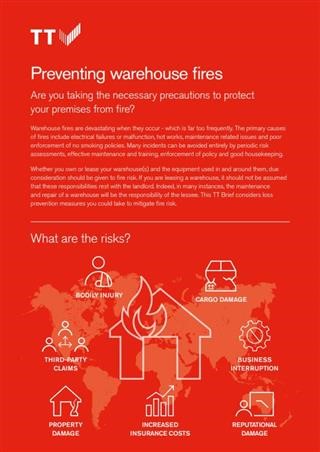Specialist international freight transport insurer TT Club has committed to the UN’s initiative designed to unite the global insurance sector’s efforts to achieve sustainability and improve the health of the planet.
Through Transport Mutual Insurance Association Limited (TT Club) is acutely aware of the requirements of all enterprises to take responsibility for achieving a sustainable future for the natural environment and to go further by adhering to the wider environmental, social and governance (ESG) aims. By applying the principles of this United Nations’ initiative, TT Club is underlining its commitment in a way that is relevant to its global risk management and insurance operations.
The Principles for Sustainable Insurance (PSI) is global framework for the insurance industry to address ESG risks and opportunities launched in 2012 by the UN Environment Programme Finance Initiative (UNEPFI). It is a global, collaborative initiative that strengthens the industry’s contribution as risk managers, insurers and investors to building resilient, inclusive and sustainable communities and economies on a healthy planet.
Commenting on the news that TT Club has been accepted as a PSI signatory, Charles Fenton, CEO said, “As a mutual insurer our overarching purpose is to make the international transport and logistics industry safer, more secure and as a result, more sustainable. We see the challenges our Members face to tackle sustainability head on and work hard to support them wherever we can. The Principles for Sustainable Insurance align with the Club’s approach in servicing its Members and we look forward to working with other like-minded organisations towards this common goal.”
The insurance industry is particularly well-placed to effect the advance of sustainability policies as it performs a triple role, as risk managers, risk carriers and investors. Insurers therefore can be particularly influential in fostering sustainable economic and social development.

The PSI is the largest collaboration between the insurance industry and the United Nations with over 220 members from all around the world. Ban Ki-Moon, ex-Secretary General of the UN supports the PSI initiative, “The Principles of Sustainable Insurance provide a global roadmap to develop and expand innovative risk management and insurance solutions. With a world premium volume of more than US$24 trillion, insurers that embed sustainability in their business operations can catalyse the kinds of financial and investment flows and long-term perspectives needed for sustainable development.”
TT Club will embrace the guidance provided by the PSI by embedding the issues of ESG in its decision-making; work with its members and business partners in extending awareness of such issues; demonstrate accountability and transparency in reporting its progress and work together with regulators and other stakeholders to promote widespread action on ESG issues.
About TT Club
TT Club is the established market-leading independent provider of mutual insurance and related risk management services to the international transport and logistics industry. TT Club’s primary objective is to help make the industry safer and more secure. Founded in 1968, the Club has more than 1100 Members, spanning container owners and operators, ports and terminals, and logistics companies, working across maritime, road, rail, and air. TT Club is renowned for its high-quality service, in-depth industry knowledge and enduring Member loyalty. It retains more than 97% of its Members with a third of its entire membership having chosen to insure with the Club for 20 years or more.









